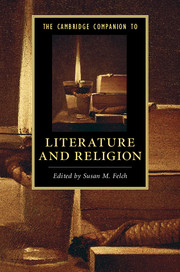3 - Postsecular Reading
from PART I - READING PRACTICES
Published online by Cambridge University Press: 05 September 2016
Summary
In the undergraduate religious studies courses that I teach, I often ask students why they show up, if not just for the sake of required credits. The answer is always, “I want to understand what's going on in the news.” And religion is certainly in the news. The public visibility and awareness of religion in current global affairs compels us to engage the “postsecular” question, although we may or may not be entering a postsecular age if that term is a descriptor for the reemergence of repressed religion after a secular age. This designation implies that religion and the secular can be conceptualized as neatly bounded and easily separable entities, or even consecutive stages on an evolutionary ladder, a questionable assumption.
A better way to define the postsecular is to see that religion and the secular are not polar opposites but have always been interdependent since their coemergence in the modern West. Although defined as apolitical, interior piety by the normative claims of secularism, religion has never been completely contained inside this model. Claiming the separation of church and state or state neutrality toward different religious traditions, secularism itself has proved to be a problem space that is already implicated in religious questions. The postsecular, therefore, is not merely disenchantment with secularism, but rather an effort to reconsider and reconfigure symbolic assumptions, cultivated sensibilities, and power relations associated with religion and to question the secular's claim to epistemic, affective, and moral-political supremacy. The postsecular is particularly attentive to the fluidity of religion as a constructed category, to the varieties of nonmodern, non-Western religious traditions, and to the flourishing of new types of “spiritual” (although almost invariably embodied) practices.
Postsecular reading follows theological reading to challenge the hegemonic universalism of “secular” reason and joins confessional reading to address the failures of the protectionist exclusionism of “secular” aesthetics. But rather than working within the comfort zone of one literature and one religion, postsecular reading ventures outside those boundaries to question the formation of the sacred or sacralization in a whole range of interlinked “secular” spheres.
- Type
- Chapter
- Information
- The Cambridge Companion to Literature and Religion , pp. 51 - 68Publisher: Cambridge University PressPrint publication year: 2016
- 2
- Cited by



